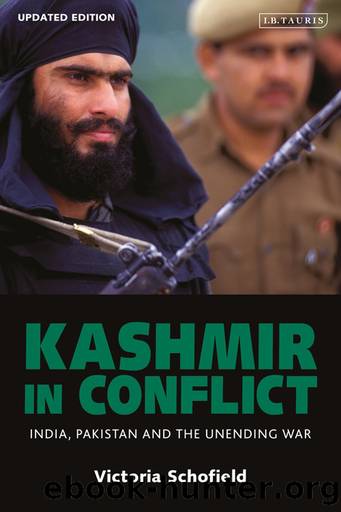Kashmir in Conflict by Schofield Victoria;

Author:Schofield, Victoria;
Language: eng
Format: epub
Publisher: I. B. Tauris & Company, Limited
Published: 2020-10-15T00:00:00+00:00
CHAPTER 9
Conflict or Consensus?
Recalling ... that an environment of peace and security is in the supreme national interest of both sides and the resolution of all outstanding issues, including Jammu and Kashmir, is essential for this purpose... Lahore declaration, 21 February 1999.
A decade after thousands of Kashmiris took to the streets to demand azadi there was still no clarity on how they could achieve their objective, when neither Pakistan nor India was prepared to contemplate azadi as meaning independence. Even so, commentators and observers continued to analyse the Kashmirisâ demand for self-determination in order to see what the consequences might be if a plebiscite were held. Firstly, would it be fair on all the inhabitants to hold a unitary plebiscite where the voice of the majority might prevail at the expense of the minority? Or should there be a regional plebiscite which would let ethnic groups decide according to their regions, even though this would inevitably formalise the partition of the state?
Secondly, if, on the basis of a majority vote, the inhabitants of the entire former princely state chose to become independent, how could one possibly prise the Northern Areas and Azad Kashmir away from Pakistan, and Ladakh and Jammu away from India? Or if there were a regional vote, and only the valley chose independence, how could it survive? Furthermore, how could the government of Pakistan continue to insist that the Kashmiris be given the right to determine their future and then permit them only the option to choose between India or Pakistan? Would, in reality, India and Pakistan concede anything at all? What could be the basis for a consensus or would the conflict continue?
World opinion
Throughout their struggle, the Kashmiri activists regretted the unwillingness of the rest of the world to assist them in what they perceived to be a âjustâ cause. They believed that their inability to attract material international support was in contrast to that given to the Afghans throughout the 1980s during their struggle against the Soviet Union; the Kashmiris were also conscious of the sub-continentâs past history, in which Britain played its own imperial role. At the height of the insurgency, their optimistic belief that they had only to create enough trouble in the valley to attract international support did not materialise. No country was willing to risk its entire agenda with New Delhi over the Kashmir cause,' wrote Time correspondent Edward Desmond in 1995 âespecially when it was clear that New Delhi had no intention of backing down.â1
In the early years of the insurgency, British Members of Parliament, MEPs, US Congressmen, human rights activists all played a part in listening to the grievances of the Kashmiris. Once they had lodged their complaints and written their reports, there was very little action they could take. International opinion was as much concerned about Pakistanâs own alleged role in âexporting terrorismâ and its potential nuclear capability, as it was about events in what India persistently termed an integral part of its territory. In the face of
Download
This site does not store any files on its server. We only index and link to content provided by other sites. Please contact the content providers to delete copyright contents if any and email us, we'll remove relevant links or contents immediately.
| Anthropology | Archaeology |
| Philosophy | Politics & Government |
| Social Sciences | Sociology |
| Women's Studies |
The Secret History by Donna Tartt(18572)
The Social Justice Warrior Handbook by Lisa De Pasquale(12042)
Thirteen Reasons Why by Jay Asher(8656)
This Is How You Lose Her by Junot Diaz(6628)
Weapons of Math Destruction by Cathy O'Neil(6006)
Zero to One by Peter Thiel(5592)
Beartown by Fredrik Backman(5490)
The Myth of the Strong Leader by Archie Brown(5335)
The Fire Next Time by James Baldwin(5149)
How Democracies Die by Steven Levitsky & Daniel Ziblatt(5050)
Promise Me, Dad by Joe Biden(5007)
Stone's Rules by Roger Stone(4963)
100 Deadly Skills by Clint Emerson(4769)
A Higher Loyalty: Truth, Lies, and Leadership by James Comey(4726)
Rise and Kill First by Ronen Bergman(4621)
Secrecy World by Jake Bernstein(4540)
The David Icke Guide to the Global Conspiracy (and how to end it) by David Icke(4507)
The Farm by Tom Rob Smith(4383)
The Doomsday Machine by Daniel Ellsberg(4339)
